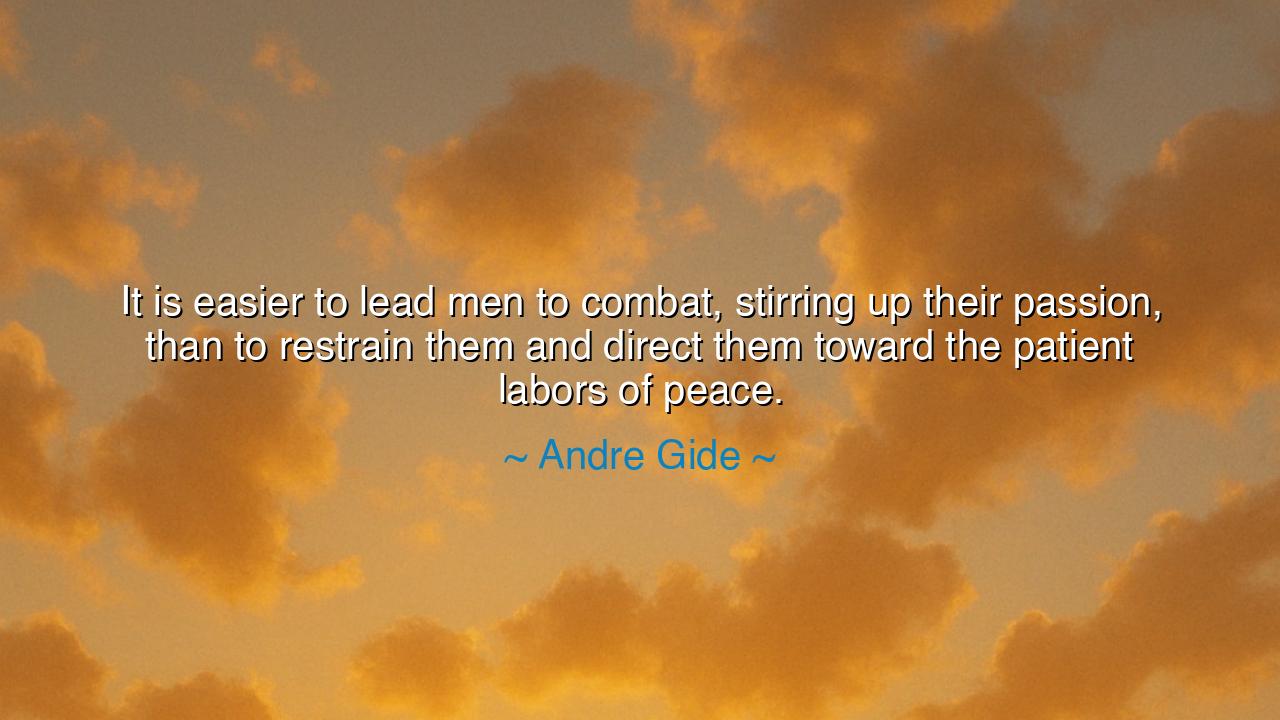
It is easier to lead men to combat, stirring up their passion
It is easier to lead men to combat, stirring up their passion, than to restrain them and direct them toward the patient labors of peace.






"It is easier to lead men to combat, stirring up their passion, than to restrain them and direct them toward the patient labors of peace." These words by André Gide speak to a profound truth about human nature and the nature of leadership. The allure of combat, of war, or even the more metaphorical battle for dominance and recognition, can stir the deepest passions within men. It is a force that, for many, is far easier to awaken than the delicate, often difficult work of creating lasting peace and building a better world through patience, diligence, and restraint. In the heat of battle, whether physical or ideological, the thrill of passion can drive men forward with great energy, but to guide them towards peace requires a much more subtle and sustained effort, grounded in wisdom and understanding.
In the ancient world, the battlefield was often seen as the ultimate test of honor and courage. Figures like Homer’s Achilles, whose exploits in the Iliad were praised and revered, embodied the idea of heroism in war. There was an intoxicating quality to their actions, driven by the desire for glory, revenge, and victory. Achilles’ fury on the battlefield is legendary, and his drive for battle was celebrated, for it was understood that the honor one could achieve through combat was unparalleled. The Greek world was built upon the idea that war was not just a necessity, but a means of self-assertion, a way to carve one’s name into the annals of history. War stirred the passion of men and rallied them to fight, often without thinking of the consequences that would follow.
However, there was also a wisdom in the ancients that cautioned against unbridled passion. Socrates, for example, believed that true strength lay not in the ability to fight, but in the discipline to know when to refrain. The philosopher’s idea of virtue was not simply about winning in battle, but about mastering the self, and cultivating the patience and restraint required to navigate the complexities of life without resorting to violence. For Socrates, it was the ability to master one’s own passions and impulses that marked the path to wisdom. Peace, in this sense, was not something easily won, but something to be carefully nurtured, through patience and understanding—traits that are often harder to cultivate than the fury of combat.
Gide’s insight, however, remains relevant to our modern world. The passion for war and the eagerness for conflict are still present in every generation, often stirred by leaders who are quick to engage in battle. The First World War, for example, was sparked by a complex web of political alliances, national pride, and unchecked ambition. Once the first shots were fired, the passion for conflict engulfed nations, and it became easier to keep the flames of war burning than to restrain them. But after the war, when the dust settled, peace was not as easy to establish. The Treaty of Versailles, which ended the war, was full of promises of peace but was also filled with conditions that left many nations embittered. Patience was required to rebuild, to heal the wounds, to address the economic hardship left in the wake of war, but such work was far less glamorous than the fight itself.
Consider the example of Nelson Mandela, whose efforts in South Africa embodied the essence of Gide's observation. Mandela spent decades in prison, resisting the urge to seek revenge against his oppressors. When the time came for him to take a leadership role, he did not call for retribution, but for reconciliation. The peace he sought was not easily won—it was the result of patience, restraint, and a commitment to a long-term vision. It was far easier for Mandela to have stirred up the anger of his people and led them into a violent uprising, but he understood that true peace would only come through understanding, dialogue, and the restraint of passions that would have led to more destruction.
Gide’s words also challenge us to consider our own actions and responses in times of conflict. Whether in our personal relationships, our communities, or on the global stage, the work of peace often requires more effort, more thought, and more restraint than the fiery passions that drive us to conflict. It is all too easy to give in to anger, to stir the flames of division or war, but to bring about healing, unity, and understanding takes a different kind of strength—a strength of patience, humility, and wisdom. Just as it was for Mandela and the great leaders of history, the path to peace is a long one, requiring endurance and a willingness to put the greater good above personal glory.
The lesson that we can take from Gide’s reflection is clear: the true measure of strength is not in our ability to fight, but in our ability to restrain and guide our passions toward the patient labors of peace. It is far easier to fight—to lead men into battle, to stoke the fires of anger and division—than it is to calm those same fires, to work toward understanding, reconciliation, and long-lasting peace. As you journey through life, take a moment to reflect on your own responses to conflict. Are you quick to anger and division, or are you willing to patiently work toward the healing of wounds and the building of bridges? The true challenge lies not in the passion of the fight, but in the restraint needed to forge the path to peace.






AAdministratorAdministrator
Welcome, honored guests. Please leave a comment, we will respond soon